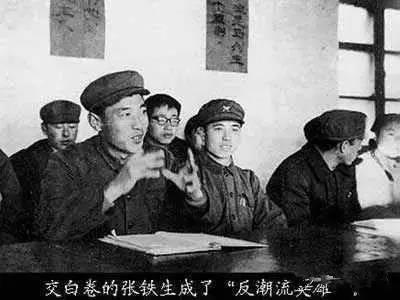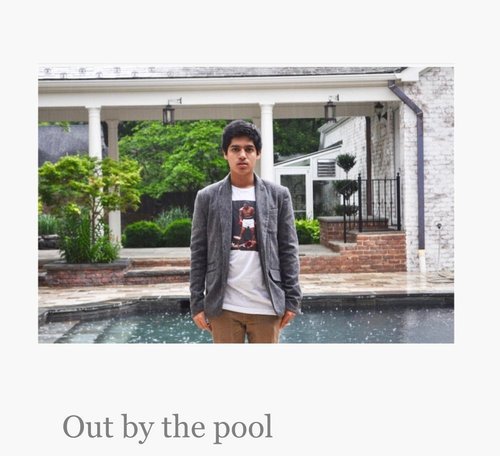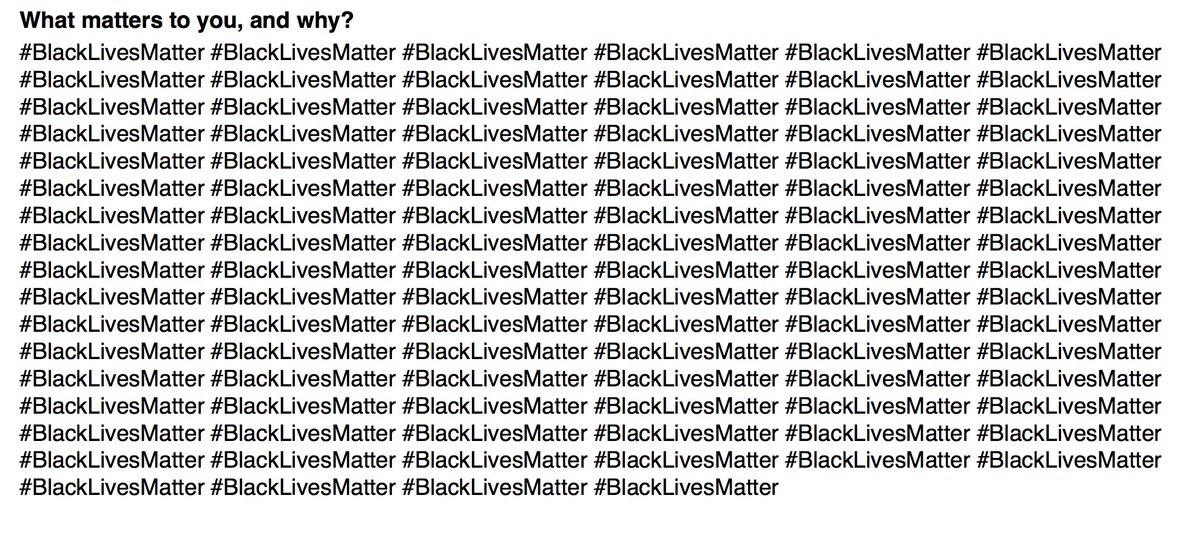


04/09/2017
[Adapted from the latest Radio Derb, now available exclusively on VDARE.com.]Steve’s been having some fun with the story of Ziad Ahmed, an 18-year-old student at an expensive private school in New Jersey. Young Ziad has been accepted for a place at Stanford University.

Congratulations to the lad. Getting accepted by Stanford is not newsy in itself, of course; and I may as well mention that he was also accepted at Princeton and Yale.
What’s newsy is that on the Stanford application form, to the questions, "What matters to you, and why?" young Ziad replied by writing — actually cut'n'pasting — "#BlackLivesMatter" a hundred times over.

Apparently the Stanford admissions officers really liked that, even though Ziad didn’t answer the second part of the question, the "why?"
They probably liked the rest of Ziad’s résumé, too. He’s been a busy Social Justice Warrior since puberty. He attended the White House Iftar dinner (that’s some kind of Muslim deal) and met then-President Obama there. He worked for Mrs. Clinton’s campaign. He’s founded Social Justice organizations, interned for lefty politicians, and so on.
Ziad’s father, an immigrant from Bangladesh, got rich as a Wall Street quant, and then seriously rich as a hedge fund manager. So this is a child of wealth and privilege leveraging his victim-group status — i.e. he’s a Muslim — to play the Social Justice game. Even those of us who think young Ziad is a loathsome little twerp have to concede that he’s played the game superbly well.
The moral of the story, as Steve points out, is that one road to wealth and power in a modern Western society is by playing that game. If you have some claim to victim status — black, woman, Muslim — with skill and luck you can parlay that into worldly success at the very highest levels, as the career of Barack Obama showed.
And, as Steve also points out, a secondary lesson here is that the highest levels of skill in playing this game are not typically found among legacy Americans. Exotic Americans like Obama and young Ziad, with roots in the old despotic-bureaucratic cultures of East Asia and Islamia grasp, much more easily than we do, that kissing up to the state ideology and its enforcers is a faster and more sure route to worldly success than sucker strategies like hard work, thrift, and honesty.
That tells us revealing things, sad things, about the direction the U.S.A. is headed in.
Reading the story of Ziad Ahmed’s reply to those questions on the Stanford application brought something else to my mind: a name, to be exact, a famous name.
The fame of this name is localized in space and time, as is often the case with fame. Everyone in the U.S.A. knows who Lizzie Borden was; outside this country, no-one ever heard of her. This is one of those names.
The name is Zhang Tiesheng. If you are Chinese and over forty years old, you just fell off your chair laughing. If not, you are frowning and saying, "Who he?"
I have to give you a little modern Chinese history.
Everyone’s heard of the Great Cultural Revolution, which Mao Tse-tung started up in 1966 to, as he saw it, reinvigorate the Communist Party, which he thought was getting too complacent and bureaucratic.
So the Cultural Revolution got going. There was a spell of chaos, when all colleges were closed. When they re-opened, students were admitted not on examination results, but on class background and political zeal. These were the so-called "worker-peasant-soldier" students. "Worker-peasant-soldier" sounds neater in Chinese: gong-nong-bing.
By the early seventies the Cultural Revolution had developed into a power struggle between radicals, led by Mao and his wife, and more moderate elements, especially in the army. Sometimes radicals had the upper hand, sometimes moderates.
In 1973 the moderates got back some control over education. They re-established college entrance examinations. That’s where Zhang Tiesheng comes in.
Zhang, age 22, sat for the new college entrance exams that year, 1973. He hadn’t studied much, though, and his heart was with the radicals' worker-peasant-soldier ideal of a college student, politically correct and fired up with revolutionary zeal. So instead of answering the questions on the paper, he left the answer spaces blank; then on the back of the paper he wrote out a short radical manifesto.

That’s what he’s famous for; he’s the bai juan ying xiong, the Empty Sheet Hero. The radical faction promoted him as a model revolutionary.
That didn’t work out well for Zhang. He had three years of fame and glory, but then Mao died. Mrs. Mao was arrested, and so was Zhang. The Cultural Revolution was over, the radicals totally defeated. Zhang got fifteen years in jail.
He had the last laugh, though. He finished serving his sentence in 1991, when Deng Xiaoping was liberalizing China’s economy and encouraging business enterprise. Zhang Tiesheng got on the bandwagon and founded a company producing animal feed. He is now worth tens of millions of dollars.

Hey: If you can game one system, you can game another. When there’s a revolution, and an old system gives way to a new one, you'd be surprised how many people that prospered under the old system, also prosper under the new, like Komarovsky in Doctor Zhivago.
This time, though, Zhang is taking no chances on a change of wind direction: He’s acquired New Zealand citizenship.
Naturally I want to make a parallel here with our own Cultural Revolution; Ziad Ahmed’s display of revolutionary zeal in filling out his Stanford application being the equivalent of Zhang Tiesheng’s blank paper 44 years ago.
I can’t quite make the parallel work, though. After the chaos they brought to China, Mao’s radicals weren’t popular. When Mao died, the whole radical movement collapsed. The moderates took power without much resistance.
There is no parallel with our situation. The anti-white, anti-male, anti-American radicals of our own time occupy all the commanding heights of American culture: the media, the academy, the judiciary, corporations, churches, even the military. Opposition to them is feeble and scattered. I can’t foresee a collapse of radical power. There is no prospect of a return to rational principles, to honest meritocracy and traditional American values.
There is surely no prospect of Ziad Ahmed being arrested and given fifteen years in the bridewell. Not that I think it should be illegal to be a repulsive, opportunistic teenage creep … but you can’t help wishing there were some downside.
There isn’t, not in today’s America. Ziad Ahmed will be rich and powerful before he’s forty. If you are a legacy American, especially if you're a white male one, you'll be shining his shoes for him. Heck, he'll probably be President one day.
The commissar tells Winston Smith in Nineteen Eighty-Four, quote: "If you want a picture of the future, imagine a boot stamping on a human face — forever." No, listeners: If you want a picture of our future, imagine some immigrant Third World huckster like Ziad Ahmed milking the Social Justice game to his own personal advantage … forever.